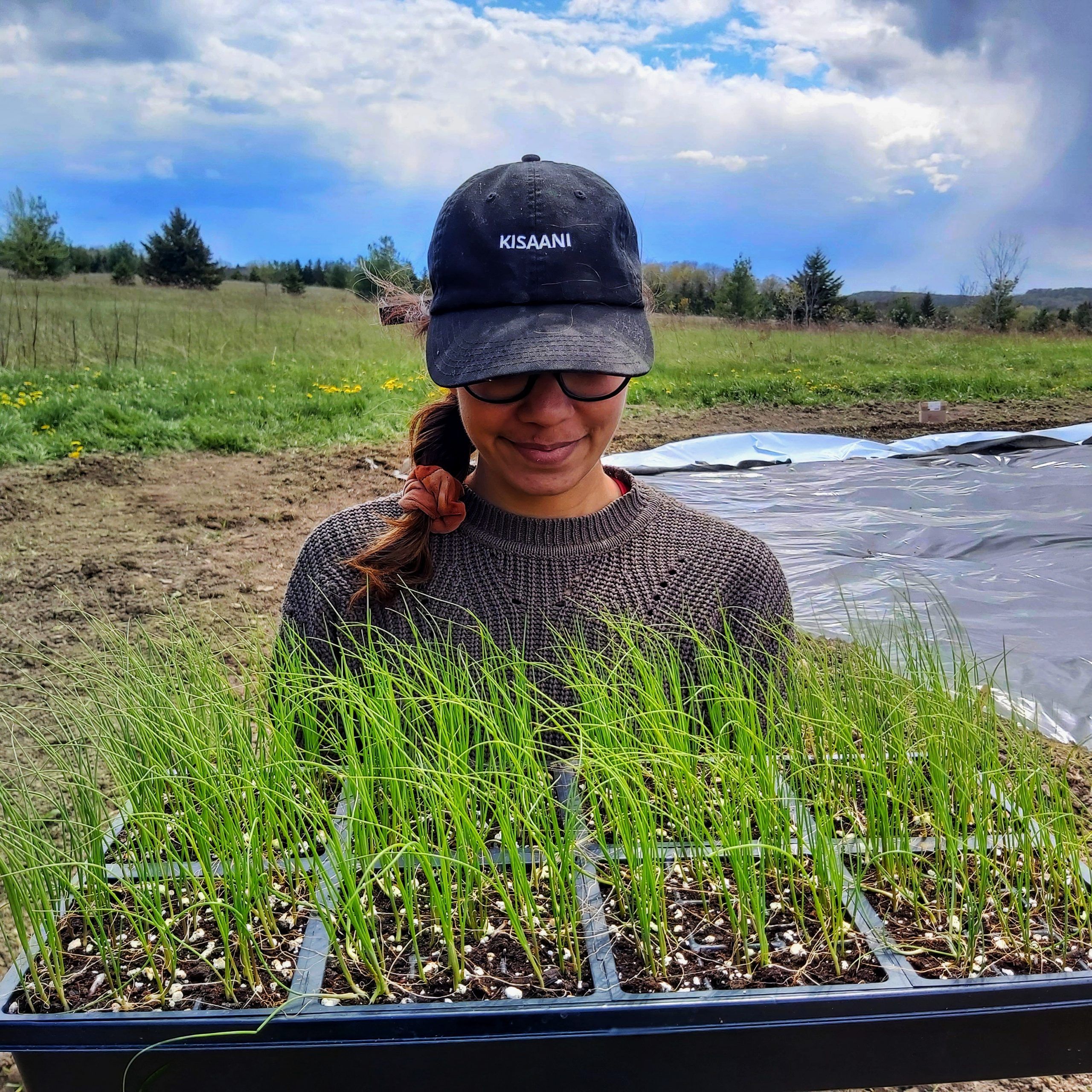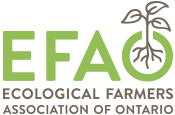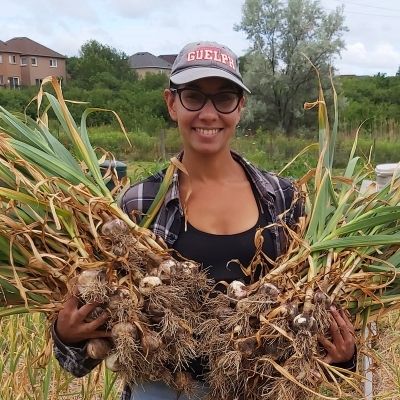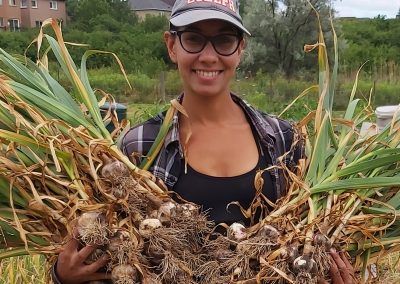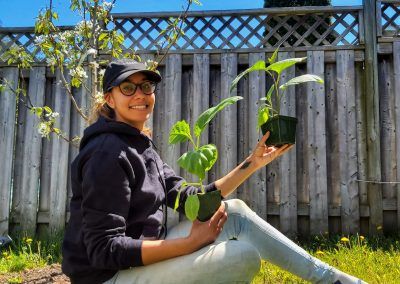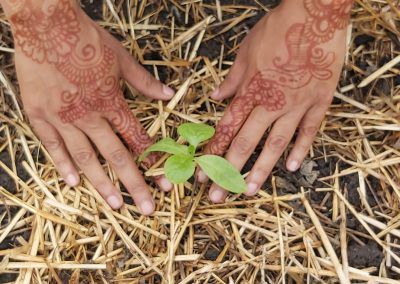Shade of Miti is a food and climate justice organization on Treaty 13 land (Mississauga, Ontario). This organization is for communities that experience oppression from food and climate systems as well as allies and accomplices. They envision sustainable food systems in Mississauga that are rooted in sovereignty and justice, and not threatened by climate change.
This article was originally published in the Fall 2021 issue of Ecological Farming in Ontario. The print publication is one of several benefits of EFAO Membership.
Can you tell us a bit about Shade of Miti?
Shade of Miti is a farming business focused around food and climate justice. I’m trying to use it as a way to build and support sustainable food systems in Mississauga and the region of Peel. We do education and advocacy work online and I also farm in Caledon, using organic and climate friendly practices. I specialize in growing food that some folks would label as “world” or “cultural” crops — basically organic produce that you don’t find commonly in farmers’ markets or organic grocery stores.
Miti means soil in Punjabi, my mother tongue. It was really important for me to have a word in the name that connects me to who I am and my ancestors, and is a good reminder of why I’m doing this. Food justice is an important aspect of this work. The “shade” part is because I’m brown and my skin reminds me of my connection to the soil. My logo is the soil texture triangle for Mississauga. And then the name shortens to SoM, which in farming is Soil Organic Matter. SoM reminds me of the climate justice and food justice pieces of what I do, because I deeply believe that soil is such an important part of my work as a farmer and community leader.
Please tell us a bit more about where, how, and what you grow!
Right now I’m growing on rented land in Caledon. I focus on growing “world” or “cultural” crops — E.g. Chinese kale, Chinese broccoli, okra, callaloo, bitter melon, cilantro, fenugreek, and a crop trial with a few different varieties of African eggplants. I’m growing a lot of hot peppers too.
I decided to focus on these crops for several reasons. I’ve always been interested in the environment, and have always shopped at farmers’ markets. I started taking my parents and grandparents to farmers’ markets a year or two ago. They really liked the concept, but they weren’t able to find the foods they wanted to buy. Some foods with cultural importance can’t be grown here, but there is so much that can that resonates with diverse communities. I want my family to not always need to go to the Indian grocery store to find bitter melon. I think it’s really important to grow those crops organically too. It’s not only white people who engage with food and food systems. I believe that everyone should be able to access local organic versions of what you eat.
In terms of how I grow, it’s really important for me to use my position as a farmer to be a climate leader. Land-based farmers have a really important role to play in climate justice, and land is key to a lot of food justice issues. This year, I’m experimenting with different types of living walkways and coverings for the soil, and I’m trying to incorporate more renewable and sustainable energy into my farm. For example, I’m playing around with battery versus solar power versus wind to pump water from a pond.
I’m also doing a lot of things related to climate action which are not directly farming but are a part of the business, such as exploring different ways of running the financial part of my business that are less damaging to the climate.
Where and how do you sell your products?
I sell my products at the Erin Mills Farmers’ Market in Mississauga every other week, and through an online farm store. The farmers’ market is really great and doing a lot of work around inclusion and diversity, however a lot of the community I want to connect with doesn’t shop at the market. Markets tend to be more white-centric food spaces and can be unwelcoming to non-white folks. The online store is a safer, more comfortable way to meet those folks. Right now I just do pick up and delivery through the online store, but once COVID is more manageable I would like to make connections with hubs in the community like health centres and cultural centres. I would love to partner with a settlement agency one day and do a drop off location there.
As a new farmer, who inspires you?
It feels so important for me to build a world where my nieces and nephews can be farmers if they want to when they grow up. I get a lot of inspiration from them, and from wanting to build something better for them.
What learning or training opportunities have you found helpful as a new farmer?
I’ve done a lot of formal education in agriculture which I don’t think is necessary for you to be a farmer. Recently I’ve been engaging with more farmer education from folks who are BIPOC or 2SLGBTQ+. I have been finding that to be more informative and relevant for my situation.
When I started farming, a lot of the folks I learned from were white. I had a lot of long conversations with white farmers, and some were really helpful, but they don’t tend to have the same experiences of taking okra to market, or growing bitter melon, for example. So my biggest tip for anyone looking into farming is to look for someone who has similar experiences and identities to you, or is farming in a similar way, so you can learn about the crops and techniques you need to know about.
What does it mean to you, to be an “ecological farmer”?
Being a farmer — I like to just call myself a farmer, as I think all farming should be done ecologically — is really important to me. A lot of ecological or organic practices are so important to fight our climate crisis. It’s also really important to me because my parents and my ancestors were farmers in Punjab, in India, and until my grandpa they farmed using ecological growing methods. My parents were farmers during the Green Revolution and I see the harm it’s caused them and my family. It’s created massive problems like farmer suicides and drought in Punjab. It’s important to me that I farm in a way that doesn’t contribute to that issue. The struggles between this community and India are linked.
Tell us about your podcast!
Yes! It’s called the Lassi Revolution podcast. A lassi is a really delicious drink in India. At the start of the farmer protests in India I was thinking about what a revolution means to me. I had been thinking of it as a huge event that changes things in a few days, but in talking to family and friends, I started realizing that a revolution can be small actions that add up to change. So I started looking for what I could do here to support a revolution, and a podcast came up as an idea.
I had also started to connect with a lot of BIPOC and 2SLGBTQ+ farmers and chefs and activists and I was wondering how to share who they are and what they’re doing, and how to help more people know about them because they’re doing really amazing work. A podcast is a way to use a platform I have access to, in order to share these stories. The podcast has been going for about 3-4 months. A few months ago the local radio station in Mississauga called me and wanted to pick it up, so now it gets aired every other week on Fridays at 3pm on Newstalk Sauga 960AM. I’ve recently brought on Rahul Mehta as a co-host to bring in more of the climate justice perspective and that’s really exciting.
What are some of the future plans for your farm/business as you look ahead?
I really want to find a rooftop or some land in or close to Mississauga to farm on, because it’s important for me to be in the city where I live and market and work. I’d love to farm in Mississauga and in Caledon, and have both a rural farm and an urban farm in the region of Peel. There’s so much potential within this region to connect urban and rural food systems, but there’s not a lot of that happening right now.
I would also love to be able to sell some of my produce to BIPOC, youth, 2SLGBTQ+ folks, and newcomer communities. And give some of my produce to caterers or restaurants, newcomers or refugees who move here with some cooking background, and have them use my produce to make food products to sell. I don’t want to just grow food. I want to participate in the full food system and the full food cycle.
I’ve been meeting a lot of Black farmers and farmers of colour in Peel, and one thing I hear from them is how hard it can be to get their products out there and sell them. I would love to have an expanded online food store, where other farmers can sell their products, and open it up to more than food. I’d like it to be a local hub to support local entrepreneurs.
I also want to do a lot more growing education. This might be informal on social media, something like a video series on how to grow, for example, callaloo or bitter melon…I’d like to share tips for growing these things that are not really included in other farming and growing education.
Not related directly to farming, I’m currently working with my really good friend to create a multi-language tree guide which highlights common urban trees in Mississauga. Right now it’s available in Punjabi and Hindi, and we’re hoping to translate it into 3 additional languages with a recent grant we got for the project. I’d also like to have a tool sharing library in Mississauga for folks to access gardening tools- I see a really great potential for this project.
